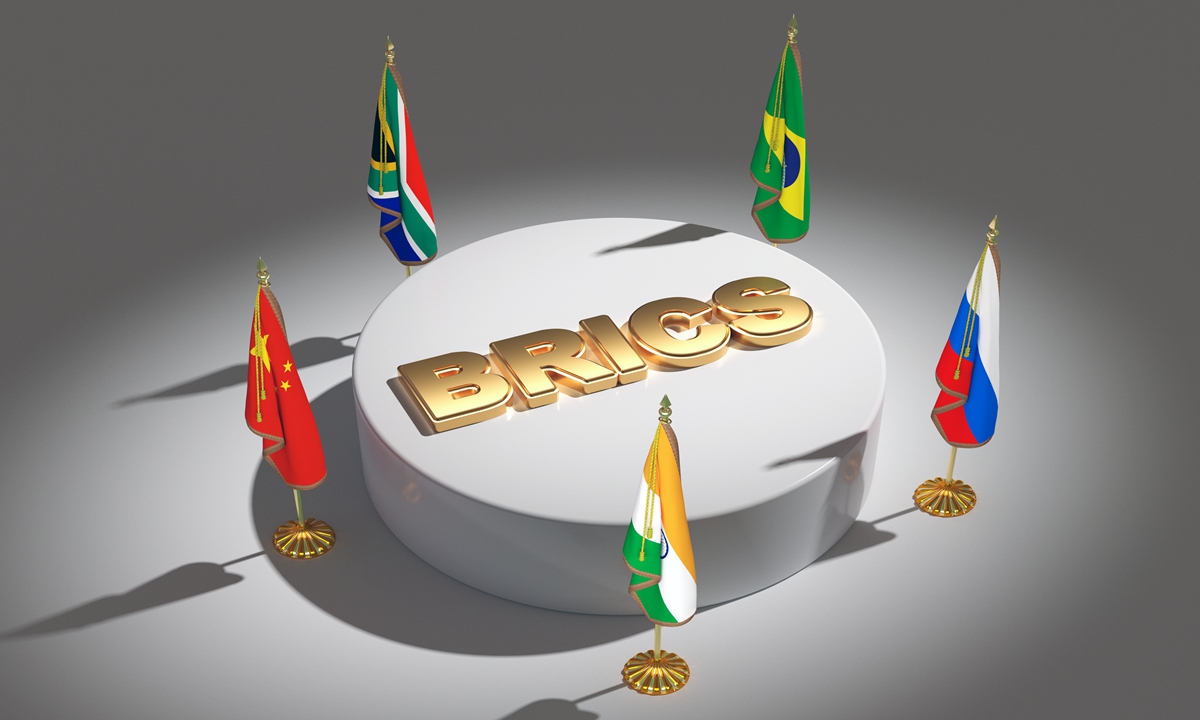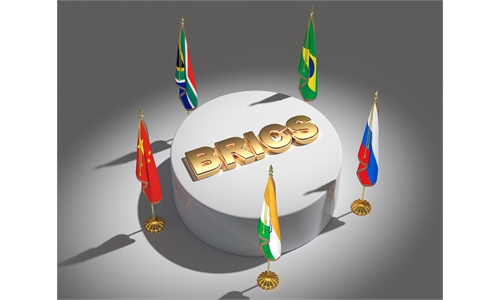Iran, Argentina’s applications to BRICS underscores pursuit of development, solidarity
Membership status decided by founding nations: experts

BRICS File photo: VCG
Iran's application to the BRICS mechanism, following a similar move by Argentina, is a move that Chinese analysts believe underscores the pursuit by developing and emerging countries of development not disturbance, of true multilateralism not ideological confrontations, and of solidarity not division.
The expansion of the BRICS group of Brazil, Russia, India, China and South Africa will also help amplify peaceful power to stabilize the international order at a time when small cliques and unilateral sanctions have been weaponized based on geopolitical considerations, analysts pointed out.
Iran has formally submitted its application to become a member of the BRICS family. "BRICS countries have played a vital role in practicing true multilateralism and promoting unity and strength among developing countries. Iran stands ready to offer all its resources and advantages, including energy reserves, human resources and scientific achievements, to help the BRICS countries achieve their goals," read a statement that the Iranian Embassy sent to the Global Times on Tuesday.
"Iran is a sustainable and trustworthy partner of BRICS countries," it said.
On Monday, the Iranian Foreign Ministry spokesperson Saeed Khatibzadeh was also cited by Iranian newspaper Kayhan as saying that a series of consultations on Iran's application to join BRICS have been held in this regard.
While attending a series of meetings during last week's BRICS summit, the Iranian President Ebrahim Raisi expressed the country's readiness to share its vast capabilities to help BRICS attain its goals. Argentina's President Alberto Fernandez also said that his country is ready to become a full member of BRICS.
In responding to Iran and Argentina's applications to BRICS, Chinese Foreign Ministry spokesperson Zhao Lijian told a press conference on Tuesday that since its establishment, the destiny of BRICS and new emerging and developing countries have been closely interwoven. China, with this year's BRICS' chairmanship, actively supports the mechanism's expansion. At the BRICS summit on June 23, leaders of the BRICS countries also agreed to discuss the standards and procedures to expand the family.
Feng Xingke, secretary general of the World Financial Forum and director of the Center for BRICS and Global Governance, told the Global Times that apart from Iran and Argentina which had previously expressed willingness to join BRICS, more and more countries have also shown interest in joining the mechanism, which demonstrates the allure BRICS has for new emerging countries as a system to seek common ground for development.
Feng noted that including Iran in BRICS will mean closer and more effective channels between resources and markets, which will benefit all members. Argentina, as a representative of new emerging economies, will also help promote cooperation between BRICS and other regional countries in Latin America.
Argentina's Ambassador to China Sabino Vaca Narvaja told the Global Times in an earlier interview that Argentina hopes to become a BRICS member as soon as possible. He noted that the BRICS cooperation system has profound significance for the building of a more balanced global order where cooperation will be unconditional and mutually beneficial. If Argentina joins BRICS, this move would also be conductive to the further development of China-Latin America relations, he said.
Argentina's Ambassador to China Sabino Vaca Narvaja told the Global Times in an earlier interview that Argentina hopes to become a BRICS member as soon as possible. He noted that the BRICS cooperation system has profound significance for the building of a more balanced global order where cooperation will be unconditional and mutually beneficial. If Argentina joins BRICS, this move would also be conductive to the further development of China-Latin America relations, he said.
Pakistan on Monday congratulated China on its successful hosting of the BRICS meetings, appreciating China's role in promoting the interests of the developing countries including Pakistan.
Being the host country, China engaged with Pakistan prior to the BRICS meetings, where decisions are taken after consultations with all BRICS members, the foreign ministry statement said.
"We do hope that future engagement of the organization would be based on the principles of inclusivity keeping in view the overall interests of the developing world and in a manner that is devoid of narrow geopolitical considerations," said the statement.
"Regrettably one member blocked Pakistan's participation," The Hindu reported on Monday, citing Pakistan's Foreign Office.
Though the office did not name any country, it was apparently referring to India, given the history of the relationship between the two nations, the report said.
As BRICS is not a treaty, any application to join in needs to be discussed among the five founding members. Whether the applicants will be firstly listed as observers or will have to undergo other protocols to obtain membership status will be decided by the members, Feng explained.
The expansion of BRICS was a heated topic during the just-concluded 14th BRICS Summit last week. Chinese Foreign Ministry spokesperson Wang Wenbin told a press conference on June 24 that as the BRICS chair country, China actively supports the BRICS in starting the membership expansion process and expanding the BRICS Plus cooperation, additionally China will encourage all BRICS parties to formulate standards and procedures for membership expansion based on consensus.
Currently, BRICS countries represent 40 percent of the world population, account for 25 percent of the global economy and 18 percent of world trade, and contribute 50 percent to the world's economic growth.
Although BRICS has not added new members over recent years, the BRICS Plus mechanism, which was first promoted in 2017, has offered an effective and successful system to link new emerging economies, BRICS countries and developing countries and to build consensus on how to deal with challenges to global development and how to achieve sustainable development, Wang Lei, director of the Center for BRICS Cooperation Studies at Beijing Normal University, told the Global Times.
Wang explained that in previous years, different representatives of developing countries and new emerging economies have been invited to attend past BRICS meetings. For example, in 2017, Egypt, Mexico, the Republic of Guinea, Tajikistan and Thailand were invited to attend the BRICS meeting held in Xiamen, the capital city of East China's Fujian Province, marking that BRICS Plus cooperation has surpassed regional limitations.
Feng pointed out that the expansion of the BRICS Plus cooperation globally has also prepared BRICS to include more members. Moreover, the New Development Bank (NDB), a multilateral financial institution established in 2015 by BRICS countries included Bangladesh, the UAE, Uruguay and Egypt in 2021.
The allure of the BRICS group and the BRICS Plus cooperation has increased with its success in pushing concrete development. By promoting solidarity within new emerging economies and developing countries, it allows these countries to jointly push forward the reform of global governance, consolidate the UN' core position in the international order, promote global peace and stability, uphold true multilateralism and globalization and protect the interests of developing countries, Wang said.
On Monday, commenting on Iran and Argentina's applications to the BRICS, Russian Foreign Ministry Spokeswoman Maria Zakharova wrote on her Telegram channel that "While the White House was thinking what to disconnect, ban or spoil in the world, Argentina and Iran applied for joining BRICS," Russian news agency TASS reported.
The BRICS group also represents a similar stance to that of other developing countries and new emerging economies, opposing ideological confrontations and a new cold war, Feng said, noting that emerging economies pay more attention on issues such as food crisis, security, post-pandemic economic recovery and global financial stability against the backdrop of the Russia-Ukraine conflicts.
Compared with US-led cliques such as G7 and NATO, which bring no solutions to the severe challenges facing the world, all the while attempting to foment global discord, analysts noted that BRICS group stands higher and sees further, representing the future of the world, a future characterized by more emerging economies aiming to promote global progress through development.

